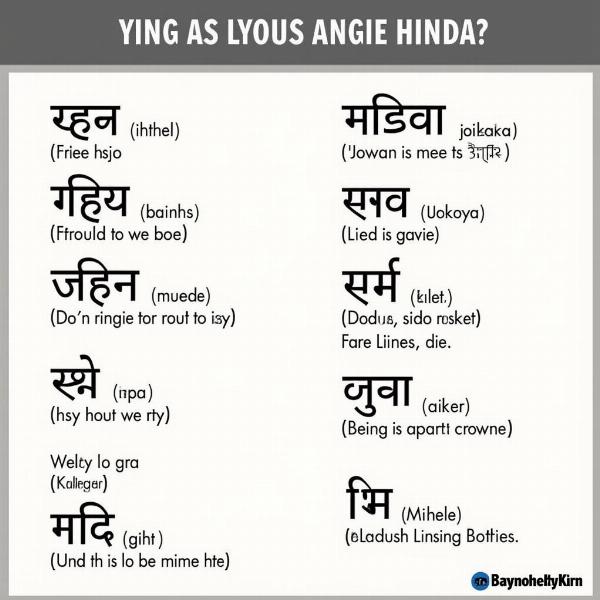Understanding the meaning and cultural implications of calling someone a liar in Hindi requires more than just a literal translation. While “you are a liar” can be directly translated as “tum jhooth bol rahe ho” (तुम झूठ बोल रहे हो) or “aap jhooth bol rahe hain” (आप झूठ बोल रहे हैं) (the more formal version), the actual impact and appropriateness of using these phrases depend heavily on the context, relationship between the speaker and listener, and the specific situation. Simply knowing the Hindi translation doesn’t equip you to navigate the subtle social dynamics at play.
Different Ways to Say “You Are a Liar” in Hindi and Their Connotations
There are several ways to express the idea of someone being untruthful in Hindi, each carrying a different weight and connotation. While “jhooth bolna” (झूठ बोलना) is the most common verb for “to lie,” other terms like “dhokha dena” (धोखा देना – to deceive) or “fareb dena” (फरेब देना – to trick) can also convey a sense of dishonesty. Using stronger terms like these can escalate the situation and should be used with caution. Likewise, terms like “mithya” (मिथ्या – false) or “galat” (गलत – wrong) can be used to address the untruth itself rather than directly accusing the person.
 Hindi Expressions for Liar
Hindi Expressions for Liar
Cultural Context of Accusing Someone of Lying in India
In Indian culture, directly accusing someone of lying, especially an elder or someone of higher social standing, can be considered disrespectful. Often, indirect language or subtle hints are preferred to avoid direct confrontation. The concept of “saving face” is important, and publicly accusing someone of dishonesty can cause significant embarrassment and damage to their reputation.
How to Politely Express Disbelief in Hindi
If you need to express disbelief or challenge someone’s statement without being overly accusatory, there are several polite alternatives. You could use phrases like “mujhe lagta hai ki aap galat hain” (मुझे लगता है कि आप गलत हैं – I think you are mistaken) or “kya aap is baat ki pushti kar sakte hain?” (क्या आप इस बात की पुष्टि कर सकते हैं? – Can you confirm this?). These phrases allow you to question the validity of the statement without directly accusing the person of lying.
Legal Implications of Lying in India
Depending on the context, lying can have legal ramifications in India. False testimony in court, fraudulent activities, and defamation are all serious offenses with legal consequences. Understanding the legal context is crucial, especially in business and legal settings.
What to Consider Before Calling Someone a Liar in Hindi
Before using any term related to lying, consider the following:
- Your relationship with the person: Is it a close friend, family member, colleague, or stranger?
- The severity of the lie: Is it a white lie or a serious deception?
- The context of the situation: Is it a private conversation or a public setting?
- Your cultural understanding: Are you aware of the cultural nuances and potential consequences?
Conclusion: Navigating the Nuances of “You Are a Liar” in Hindi
Accusing someone of lying in Hindi, like any language, requires sensitivity and cultural awareness. Choosing the right words and considering the context can significantly impact how your message is received. While a direct translation of “you are a liar” exists, understanding the various nuances and cultural implications is crucial for effective communication. Remember to prioritize respect and politeness, especially in a culture where direct confrontation is often avoided. Using indirect language and focusing on clarifying the truth rather than accusing the individual can be a more effective approach.
FAQs
- What is the most common way to say “you are a liar” in Hindi? The most common way is “tum jhooth bol rahe ho” (तुम झूठ बोल रहे हो) or the more formal “aap jhooth bol rahe hain” (आप झूठ बोल रहे हैं).
- Is it considered rude to call someone a liar in India? Yes, especially to elders or those in positions of authority. It’s best to use more polite language.
- What are some polite ways to express disbelief in Hindi? You can say “mujhe lagta hai ki aap galat hain” (I think you are mistaken) or “kya aap is baat ki pushti kar sakte hain?” (Can you confirm this?).
- Are there legal implications for lying in India? Yes, depending on the context. False testimony, fraud, and defamation can have serious legal consequences.
- What should I consider before accusing someone of lying in Hindi? Consider your relationship with the person, the severity of the lie, the context, and your cultural understanding.
Meaning-Hindi.in is your trusted partner for professional Hindi translation services. We specialize in business, legal, technical, website, educational, and specialized translations, offering fast and accurate services. Whether you need to translate documents, legal contracts, or website content, our team of expert translators is here to help. Contact us today at [email protected] or call us at +91 11-4502-7584. Meaning-Hindi.in provides high-quality Hindi translations for various needs, ensuring accuracy and cultural sensitivity.